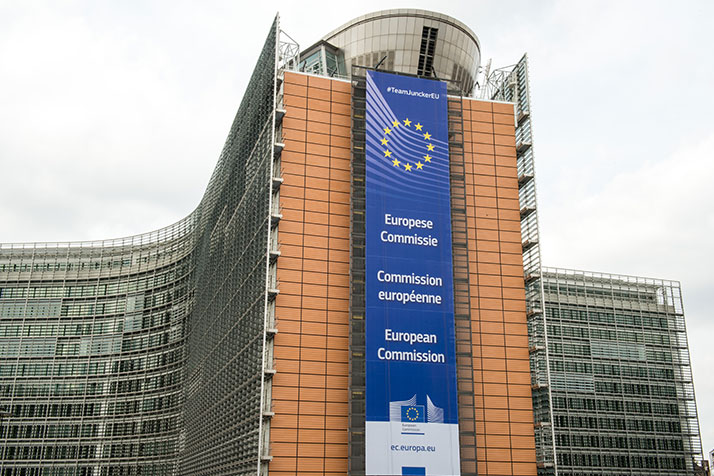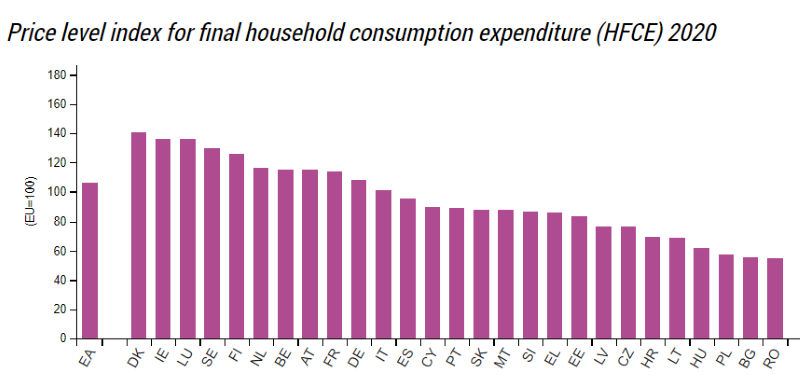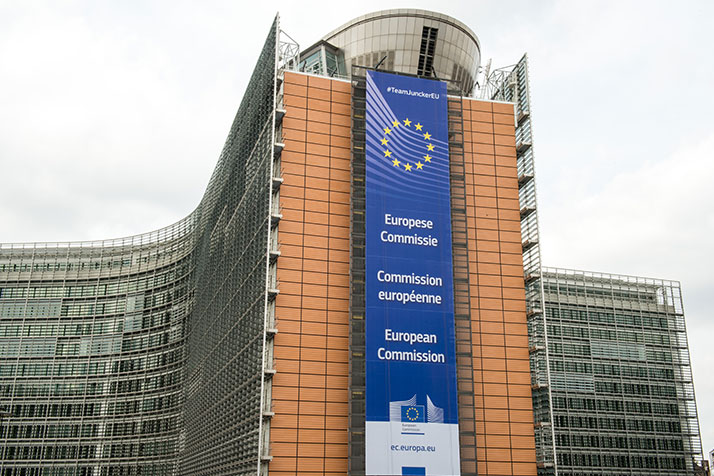Infringements: Commission refers Greece, Ireland and Romania to the Court of Justice for not implementing anti-money laundering rules

Today, the Commission referred Greece and Romania to the Court of Justice of the EU for failing to implement the 4th Anti-Money Laundering Directive into their national law.
Ireland implemented only a very limited part of the rules and is therefore also referred to the Court of Justice. The Commission proposed that the Court charges a lump sum and daily penalties until the three countries take the necessary action.
Věra Jourová, Commissioner for Justice, Consumers and Gender Equality said: “Money laundering and terrorist financing affect the EU as a whole. We cannot afford to let any EU country be the weakest link. Money laundered in one country can and often will support crime in another country. This is why we require that all Member States take the necessary steps to fight money laundering, and thereby also dry up criminal and terrorist funds. We will continue to follow implementation of these EU rules by Member States very closely and as a matter of priority.”
The Member States had until 26 June 2017 to transpose the 4th Anti-Money Laundering Directive into their national legislation. These rules reinforce the previously existing rules by:
strengthening the risk assessment obligation for banks, lawyers, and accountants;
setting clear transparency requirements about beneficial ownership for companies;
facilitating cooperation and exchange of information between Financial Intelligence Units from different Member States to identify and follow suspicious transfers of money to prevent and detect money laundering or terrorist financing;
establishing a coherent policy towards non-EU countries that have deficient anti-money laundering and counter-terrorist financing rules;
reinforcing the sanctioning powers of competent authorities.
Meanwhile, in the wake of the Panama Papers revelations and the terrorist attacks in Europe, the Commission proposed a 5th Anti-Money Laundering Directive to further step up the fight against money laundering and terrorist financing. These new rules aim at ensuring a high level of safeguards for financial flows from high-risk third countries, enhancing the access of Financial Intelligence Units to information, creating centralised bank account registers, and tackling terrorist financing risks linked to virtual currencies and pre-paid cards. These new rules entered into force on 9 July 2018 following its publication in the EU´s Official Journal and Member States will have to transpose the 5th Anti-Money Laundering Directive into national legislation by 10 January 2020.
Next steps
Regarding the 4th Anti-Money Laundering Directive the Commission has opened so far infringement procedures for non-communication of transposition measures against 20 Member States: 3 are currently at the stage of court referrals, 9 at the stage of reasoned opinions, and 8 at the stage of Letters of Formal Notice (see 8 previous reasoned opinions sent in December 2017, an additional 2 in March 2018).
In the meantime, a majority of Member States have adopted the relevant laws. The Commission is now carefully analysing whether these laws completely transpose the provisions of the 4th Anti-Money Laundering Directive before deciding on whether closing or proceeding with further infringements against Member States.
Background
In July 2017 the Commission opened infringement proceedings for non-communication of the transposition measures and sent a letter of formal notice to sixteen Member States, who had either not notified any measures (Bulgaria, Cyprus, Estonia, Greece, Finland, Hungary, Luxembourg, Latvia, Malta, the Netherlands, Poland, Portugal, Romania) or whose measure were not satisfactory (Ireland, Lithuania, Slovakia).
In November 2017 (Belgium and Spain) and January 2018 (Austria and France), the Commission opened infringement proceedings for non-communication of the transposition measures as the measures notified by these Member States represented only a partial transposition.
Last December 2017- 8 Member States (Bulgaria, Cyprus, Greece, Luxembourg, Malta, the Netherlands, Poland and Romania) had not yet notified any transposition measure. The Commission therefore sent them a reasoned opinion.
In March 2018 the Commission also sent a reasoned opinion to Slovakia and Ireland who – despite having notified to the Commission a partial transposition – had not yet transposed the main obligations of the 4th Anti-money laundering Directive into their national law.
Following these infringement steps, a majority of Member States have adopted the relevant laws. The Commission is now carefully analysing whether these laws completely implement the provisions of the 4th Anti-Money Laundering Directive before deciding on whether closing these infringements or further proceeding with infringements against Member States.
Today, the Commission has also sent reasoned opinions to Latvia and Spain and an additional reasoned opinion to Malta for failing to transpose the 4th Anti-Money Laundering Directive into national law as the assessment of the transposition laws notified by these countries has showed that the transposition is not complete.
Source: European Commission statement
Comentarii
Nu există comentarii pentru această știre.
Adauga un comentariu
Alte stiri din categoria: Noutati Comisia Europeana
Avertismentul Comitetului European pentru risc sistemic (CERS) privind vulnerabilitățile din sistemul financiar al Uniunii
Avertismentul Comitetului European pentru risc sistemic privind vulnerabilitățile din sistemul financiar al Uniunii (CERS/2022/7)CONSILIUL GENERAL AL COMITETULUI EUROPEAN PENTRU RISC SISTEMIC,având în vedere Tratatul privind funcționarea Uniunii Europene,având în vedere Acordul privind Spațiul Economic European (SEE)[i] , în special Anexa IX la acesta,având în vedere Regulamentul (UE) nr. 1092/2010 al Parlamentului European și al Consiliului din 24 noiembrie 2010 privind supravegherea macroprudențială la nivelul Uniunii Europene a sistemului financiar și de înființare a unui Comitet European pentru Risc Sistemic[ii] , în special articolul 3 alineatul (2), litera (c) și articolele 16 și 18,având în vedere Decizia CERS/2011/1 a Comitetului european pentru risc sistemic din 20 ianuarie 2011 de adoptare a Regulamentului de procedură al Comitetului european pentru risc sistemic[iii], în special articolul 18,întrucât:(1) Sistemul financiar al Uniunii s-a dovedit rezilient până acum la creșterea tensiunilor... detalii
Cele mai mici preturi din Europa sunt in Romania
România a reușit să reducă indicele relativ al prețurilor în plină pandemie la 54,8% din media UE și să se plaseze pe ultimul loc între statele membre la acest indicator,... detalii
State aid: Commission refers Romania to Court for failure to recover illegal aid worth up to €92 million
The European Commission has decided to refer Romania to the European Court of Justice for failing to fully recover illegal State aid worth up to €92 million from Viorel and Ioan Micula and their group of companies, as required by a Commissiondecision of 2015.An arbitral award of December 2013 (Micula v Romania) found that by revoking an investment incentive scheme in 2005, four years prior to its scheduled expiry in 2009, Romania had infringed a bilateral investment treaty between Romania and Sweden. Romania had abolished the scheme as part of the process of accession to the EU in order to comply with EU State aid rules in its national legislation.The arbitral tribunal ordered Romania to compensate the claimants, Viorel and Ioan Micula, two investors with Swedish citizenship, for not having benefitted in full from the... detalii
Comisia Europeana publica raportul privind progresele inregistrate de Romania in cadrul mecanismului de cooperare si de verificare (MCV)
Comisia Europeană - Comunicat de presăComisia Europeană publică raportul privind progresele înregistrate de România în cadrul mecanismului de cooperare și de verificareStrasbourg, 13 noiembrie 2018Comisia Europeană publică raportul privind progresele... detalii
 Infringements: Commission refers Greece, Ireland and Romania to the Court of Justice for not implementing anti-money laundering rules
Infringements: Commission refers Greece, Ireland and Romania to the Court of Justice for not implementing anti-money laundering rules
 Council of the European Union statement on Bulgaria path towards ERM II participation
Council of the European Union statement on Bulgaria path towards ERM II participation
 Romania, pe ultimul loc in Europa la digitalizare
Romania, pe ultimul loc in Europa la digitalizare
 Platile in euro vor avea aceleasi comisioane ca cele in lei, a decis Comisia Europeana
Platile in euro vor avea aceleasi comisioane ca cele in lei, a decis Comisia Europeana
 Comisia Europeana prezinta un plan de actiune pentru tehnologiile financiare (FinTech)
Vezi toate stirile
Comisia Europeana prezinta un plan de actiune pentru tehnologiile financiare (FinTech)
Vezi toate stirile
Criza COVID-19
- In majoritatea unitatilor BRD se poate intra fara certificat verde
- La BCR se poate intra fara certificat verde
- Firmele, obligate sa dea zile libere parintilor care stau cu copiii in timpul pandemiei de coronavirus
- CEC Bank: accesul in banca se face fara certificat verde
- Cum se amana ratele la creditele Garanti BBVA
Topuri Banci
- Topul bancilor dupa active si cota de piata in perioada 2022-2015
- Topul bancilor cu cele mai mici dobanzi la creditele de nevoi personale
- Topul bancilor la active in 2019
- Topul celor mai mari banci din Romania dupa valoarea activelor in 2018
- Topul bancilor dupa active in 2017
Asociatia Romana a Bancilor (ARB)
- Băncile din România nu au majorat comisioanele aferente operațiunilor în numerar
- Concurs de educatie financiara pentru elevi, cu premii in bani
- Creditele acordate de banci au crescut cu 14% in 2022
- Romanii stiu educatie financiara de nota 7
- Gradul de incluziune financiara in Romania a ajuns la aproape 70%
ROBOR
- ROBOR: ce este, cum se calculeaza, ce il influenteaza, explicat de Asociatia Pietelor Financiare
- ROBOR a scazut la 1,59%, dupa ce BNR a redus dobanda la 1,25%
- Dobanzile variabile la creditele noi in lei nu scad, pentru ca IRCC ramane aproape neschimbat, la 2,4%, desi ROBOR s-a micsorat cu un punct, la 2,2%
- IRCC, indicele de dobanda pentru creditele in lei ale persoanelor fizice, a scazut la 1,75%, dar nu va avea efecte imediate pe piata creditarii
- Istoricul ROBOR la 3 luni, in perioada 01.08.1995 - 31.12.2019
Taxa bancara
- Normele metodologice pentru aplicarea taxei bancare, publicate de Ministerul Finantelor
- Noul ROBOR se va aplica automat la creditele noi si prin refinantare la cele in derulare
- Taxa bancara ar putea fi redusa de la 1,2% la 0,4% la bancile mari si 0,2% la cele mici, insa bancherii avertizeaza ca indiferent de nivelul acesteia, intermedierea financiara va scadea iar dobanzile vor creste
- Raiffeisen anunta ca activitatea bancii a incetinit substantial din cauza taxei bancare; strategia va fi reevaluata, nu vor mai fi acordate credite cu dobanzi mici
- Tariceanu anunta un acord de principiu privind taxa bancara: ROBOR-ul ar putea fi inlocuit cu marja de dobanda a bancilor
Statistici BNR
- Deficitul contului curent, creștere cu 16% în ianuarie 2025
- Deficitul contului curent, aproape 30 miliarde euro în 2024
- Deficitul contului curent, aproape 20 miliarde euro după primele nouă luni
- Deficitul contului curent, aproape 18 miliarde euro după primele opt luni
- Deficitul contului curent, peste 9 miliarde euro pe primele cinci luni
Legislatie
- Decizia nr.105/2007 privind raportarea la Biroul de Credit
- Legea nr. 311/2015 privind schemele de garantare a depozitelor şi Fondul de garantare a depozitelor bancare
- Rambursarea anticipata a unui credit, conform OUG 50/2010
- OUG nr.21 din 1992 privind protectia consumatorului, actualizata
- Legea nr. 190 din 1999 privind creditul ipotecar pentru investiții imobiliare
Lege plafonare dobanzi credite
- Care este dobanda maxima la un credit IFN?
- BNR propune Parlamentului plafonarea dobanzilor la creditele bancilor intre 1,5 si 4 ori peste DAE medie, in functie de tipul creditului; in cazul IFN-urilor, plafonarea dobanzilor nu se justifica
- Legile privind plafonarea dobanzilor la credite si a datoriilor preluate de firmele de recuperare se discuta in Parlament (actualizat)
- Legea privind plafonarea dobanzilor la credite nu a fost inclusa pe ordinea de zi a comisiilor din Camera Deputatilor
- Senatorul Zamfir, despre plafonarea dobanzilor la credite: numai bou-i consecvent!
Anunturi banci
- BCR este inchisa vineri, 18 aprilie, si luni, 21 aprilie
- Cererile de transfer de bani prin Whatsapp, Telegram, Messenger sunt fraude
- Un telefon sau mesaj care pare de la banca poate fi frauda
- Cererea unui ajutor in bani poate fi o inselaciune
- Cate reclamatii primeste Intesa Sanpaolo Bank si cum le gestioneaza
Analize economice
- Inflația anuală, redusă la 4,86%
- Comerțul, a cincea lună consecutivă de ajustare a creșterii
- Pensia reală a crescut cu peste 15% anul trecut
- Deficitul bugetar, rezultat slab după primele două luni
- Deficit comercial în creștere cu 38,5% pe ianuarie 2025
Ministerul Finantelor
- Deficitul bugetar, din ce în ce mai mare la început de an
- -8,65% din PIB, deficit bugetar pe anul 2024
- Datoria publică, 51,4% din PIB la mijlocul anului
- Deficit bugetar de 3,6% din PIB după prima jumătate a anului
- Deficit bugetar de 3,4% din PIB după primele cinci luni ale anului
Biroul de Credit
- FUNDAMENTAREA LEGALITATII PRELUCRARII DATELOR PERSONALE IN SISTEMUL BIROULUI DE CREDIT
- BCR: prelucrarea datelor personale la Biroul de Credit
- Care banci si IFN-uri raporteaza clientii la Biroul de Credit
- Ce trebuie sa stim despre Biroul de Credit
- Care este procedura BCR de raportare a clientilor la Biroul de Credit
Procese
- ANPC pierde un proces cu Intesa si ARB privind modul de calcul al ratelor la credite
- Un client Credius obtine in justitie anularea creditului, din cauza dobanzii prea mari
- Hotararea judecatoriei prin care Aedificium, fosta Raiffeisen Banca pentru Locuinte, si statul sunt obligati sa achite unui client prima de stat
- Decizia Curtii de Apel Bucuresti in procesul dintre Raiffeisen Banca pentru Locuinte si Curtea de Conturi
- Vodafone, obligata de judecatori sa despagubeasca un abonat caruia a refuzat sa-i repare un telefon stricat sau sa-i dea banii inapoi (decizia instantei)
Stiri economice
- Deficitul comercial pe primele două luni ale anului, majorat cu 35%
- România, campioana europeană la șomajul tinerilor
- România, pe locul trei în UE la creșterea costului salarial în T4 2024
- Producția industrială, scădere conjuncturală în ianuarie 2025
- Datoria publică, 54,6% din PIB la finele lui 2024
Statistici
- România, marginal peste Estonia la inflația anuală
- România, a doua țară din UE ca pondere a salariaților cu venituri mici
- România, pe locul trei în UE la creșterea costului muncii în T2 2024
- Cheltuielile cu pensiile - România, pe locul 19 în UE ca pondere în PIB
- Dobanda din Cehia a crescut cu 7 puncte intr-un singur an
FNGCIMM
- Programul IMM Invest continua si in 2021
- Garantiile de stat pentru credite acordate de FNGCIMM au crescut cu 185% in 2020
- Programul IMM invest se prelungeste pana in 30 iunie 2021
- Firmele pot obtine credite bancare garantate si subventionate de stat, pe baza facturilor (factoring), prin programul IMM Factor
- Programul IMM Leasing va fi operational in perioada urmatoare, anunta FNGCIMM
Calculator de credite
- ROBOR la 3 luni a scazut cu aproape un punct, dupa masurile luate de BNR; cu cat se reduce rata la credite?
- In ce mall din sectorul 4 pot face o simulare pentru o refinantare?
Noutati BCE
- Dobanda la euro scade la 2,25%
- Acord intre BCE si BNR pentru supravegherea bancilor
- Banca Centrala Europeana (BCE) explica de ce a majorat dobanda la 2%
- BCE creste dobanda la 2%, dupa ce inflatia a ajuns la 10%
- Dobânda pe termen lung a continuat să scadă in septembrie 2022. Ecartul față de Polonia și Cehia, redus semnificativ
Noutati EBA
- Bancile romanesti detin cele mai multe titluri de stat din Europa
- Guidelines on legislative and non-legislative moratoria on loan repayments applied in the light of the COVID-19 crisis
- The EBA reactivates its Guidelines on legislative and non-legislative moratoria
- EBA publishes 2018 EU-wide stress test results
- EBA launches 2018 EU-wide transparency exercise
Noutati FGDB
- Banii din banci sunt garantati, anunta FGDB
- Depozitele bancare garantate de FGDB au crescut cu 13 miliarde lei
- Depozitele bancare garantate de FGDB reprezinta doua treimi din totalul depozitelor din bancile romanesti
- Peste 80% din depozitele bancare sunt garantate
- Depozitele bancare nu intra in campania electorala
CSALB
- Sistemul bancar romanesc este deosebit de bine pregatit pentru orice fel de socuri
- La CSALB poti castiga un litigiu cu banca pe care l-ai pierde in instanta
- Negocierile dintre banci si clienti la CSALB, in crestere cu 30%
- Sondaj: dobanda fixa la credite, considerata mai buna decat cea variabila, desi este mai mare
- CSALB: Romanii cu credite caută soluții pentru reducerea ratelor. Cum raspund bancile
First Bank
- Ce trebuie sa faca cei care au asigurare la credit emisa de Euroins
- First Bank este reprezentanta Eurobank in Romania: ce se intampla cu creditele Bancpost?
- Clientii First Bank pot face plati prin Google Pay
- First Bank anunta rezultatele financiare din prima jumatate a anului 2021
- First Bank are o noua aplicatie de mobile banking
Noutati FMI
- FMI: criza COVID-19 se transforma in criza economica si financiara in 2020, suntem pregatiti cu 1 trilion (o mie de miliarde) de dolari, pentru a ajuta tarile in dificultate; prioritatea sunt ajutoarele financiare pentru familiile si firmele vulnerabile
- FMI cere BNR sa intareasca politica monetara iar Guvernului sa modifice legea pensiilor
- FMI: majorarea salariilor din sectorul public si legea pensiilor ar trebui reevaluate
- IMF statement of the 2018 Article IV Mission to Romania
- Jaewoo Lee, new IMF mission chief for Romania and Bulgaria
Noutati BERD
- Creditele neperformante (npl) - statistici BERD
- BERD este ingrijorata de investigatia autoritatilor din Republica Moldova la Victoria Bank, subsidiara Bancii Transilvania
- BERD dezvaluie cat a platit pe actiunile Piraeus Bank
- ING Bank si BERD finanteaza parcul logistic CTPark Bucharest
- EBRD hails Moldova banking breakthrough
Noutati Federal Reserve
- Federal Reserve anunta noi masuri extinse pentru combaterea crizei COVID-19, care produce pagube "imense" in Statele Unite si in lume
- Federal Reserve urca dobanda la 2,25%
- Federal Reserve decided to maintain the target range for the federal funds rate at 1-1/2 to 1-3/4 percent
- Federal Reserve majoreaza dobanda de referinta pentru dolar la 1,5% - 1,75%
- Federal Reserve issues FOMC statement
Noutati BEI
- BEI a redus cu 31% sprijinul acordat Romaniei in 2018
- Romania implements SME Initiative: EUR 580 m for Romanian businesses
- European Investment Bank (EIB) is lending EUR 20 million to Agricover Credit IFN
Mobile banking
- Comisioanele BRD pentru MyBRD Mobile, MyBRD Net, My BRD SMS
- Termeni si conditii contractuale ale serviciului You BRD
- Recomandari de securitate ale BRD pentru utilizatorii de internet/mobile banking
- CEC Bank - Ghid utilizare token sub forma de card bancar
- Cinci banci permit platile cu telefonul mobil prin Google Pay
Noutati Comisia Europeana
- Avertismentul Comitetului European pentru risc sistemic (CERS) privind vulnerabilitățile din sistemul financiar al Uniunii
- Cele mai mici preturi din Europa sunt in Romania
- State aid: Commission refers Romania to Court for failure to recover illegal aid worth up to €92 million
- Comisia Europeana publica raportul privind progresele inregistrate de Romania in cadrul mecanismului de cooperare si de verificare (MCV)
- Infringements: Commission refers Greece, Ireland and Romania to the Court of Justice for not implementing anti-money laundering rules
Noutati BVB
- BET AeRO, primul indice pentru piata AeRO, la BVB
- Laptaria cu Caimac s-a listat pe piata AeRO a BVB
- Banca Transilvania plateste un dividend brut pe actiune de 0,17 lei din profitul pe 2018
- Obligatiunile Bancii Transilvania se tranzactioneaza la Bursa de Valori Bucuresti
- Obligatiunile Good Pople SA (FRU21) au debutat pe piata AeRO
Institutul National de Statistica
- România, la 78% din PIB-ul mediu pe locuitor al UE
- Producția industrială, la cota -1,8% după 11 luni din 2024
- Deficitul contului curent, peste 26 miliarde euro în noiembrie 2024
- Comerțul cu amănuntul - în creștere cu 8% pe primele 10 luni
- Deficitul balanței comerciale la 9 luni, cu 15% mai mare față de aceeași perioadă a anului trecut
Informatii utile asigurari
- Data de la care FGA face plati pentru asigurarile RCA Euroins: 17 mai 2023
- Asigurarea împotriva dezastrelor, valabilă și in caz de faliment
- Asiguratii nu au nevoie de documente de confirmare a cutremurului
- Cum functioneaza o asigurare de viata Metropolitan pentru un credit la Banca Transilvania?
- Care sunt documente necesare pentru dosarul de dauna la Cardif?
ING Bank
- La ING se vor putea face plati instant din decembrie 2022
- Cum evitam tentativele de frauda online?
- Clientii ING Bank trebuie sa-si actualizeze aplicatia Home Bank pana in 20 martie
- Obligatiunile Rockcastle, cel mai mare proprietar de centre comerciale din Europa Centrala si de Est, intermediata de ING Bank
- ING Bank transforma departamentul de responsabilitate sociala intr-unul de sustenabilitate









